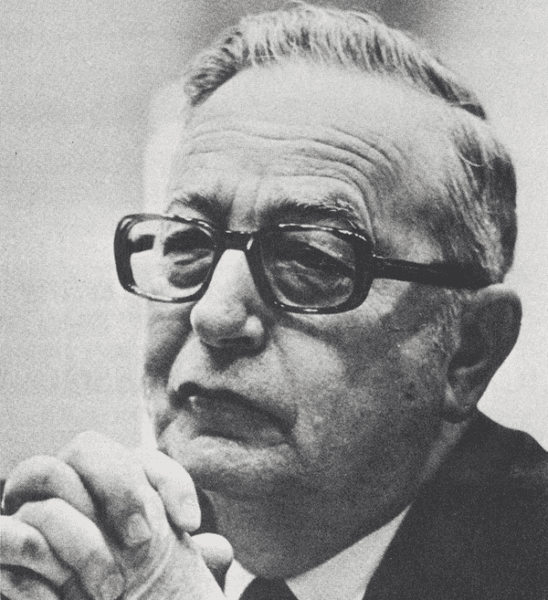
Richard B. Morris
Richard B. Morris, 84, the Gouverneur Morris Professor of History Emeritus and editor of The Papers of John Jay, Columbia University, died March 3, 1989.
One of this century’s most original and prolific scholars of American history, Dr. Morris’s career of more than six decades included 30 years of teaching at Columbia. From his first scholarly article, published when he was 15, to “The Constitutional Framework,” which appeared in a book of essays this spring, he devoted himself to the service of historical writing and to pioneering new areas of research. He made seminal contributions to the study of legal, labor, diplomatic, social, and political history.
Among his more than 40 books are The Peacemakers: The Great Powers and American Independence (1965), which won the Bancroft Prize; Studies in the History of American Law (1930);Government and Labor in Early America (1946, reissued in 1965 and 1983) and, most recently, The Forging of the Union, 1781–1789 (1987), a revisionist and widely acclaimed treatment of the Confederation years. He was the editor of The Encyclopedia of American History, which for 30 years has been the standard one-volume reference work on the subject; he was at work on its seventh edition at the time of his death as well as one of the last two volumes of the four-volume Papers of John Jay.
Among his many awards was the Bruce Catton Prize, given last year by the Society of American Historians, for his lifetime achievement in the writing of American history.
A former president of the American Historical Association, Dr. Morris was co-chair with James MacGregor Burns of Project ’87, a joint program of the AHA and the American Political Science Association to encourage scholarly and educational efforts to commemorate the bicentennial of the U.S. Constitution. He lectured world wide and had been on the faculty of the Kennedy Institute of American Studies at the Free University of Berlin and the faculty of Hebrew University in Jerusalem. He also wrote seven children’s books on historical subjects. Colleagues and former students, who published a festschrift in his honor in 1973, noted that he lectured with enthusiasm—and machine-gun tempo—but never too intensely to exclude student participation.
Born July 24, 1904, in New York City and graduated cum laude in history in 1924 from City College of New York, he studied under legal philosopher Morris R. Cohen. He earned his Ph.D. at Columbia University in colonial legal history under his mentor Evarts B. Greene in 1930, taking a full course load at Columbia Law School while completing his graduate studies. He began teaching at City College in 1930 and developed wide-ranging research programs in legal, social and economic history. He also served on Mayor John V. Lindsay’s task force on municipal archives. He started teaching at Columbia in 1946 while continuing to produce influential works, including The American Revolution Reconsidered (1967), The Emerging Nations and the American Revolution (1970), and Seven Who Shaped Our Destiny: The Founding Fathers as Revolutionaries (1973).
Active in public service, Professor Morris was chair of the board of trustees of the John Jay Homestead, the state historic site and national historic landmark in Katonah, New York, and a member of the permanent committee for the Oliver Wendell Holmes Devise History of the Supreme Court. He was an adviser to Presidents Johnson and Nixon on historical matters and testified before Congress, notably during hearings on the War Powers Act in the early 1970’s. His book, Great Presidential Decisions, could often be found prominently displayed in the White House.
Professor Morris is survived by his wife of 56 years, the former Berenice Robinson, a musician and composer who taught at Long Island University; two sons, Jeffrey of Philadelphia and Donald of Cheyenne, and four grandchildren.
Cynthia Harrison
former deputy director, Project '87
Fred Knubel
Columbia University